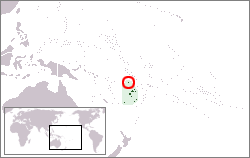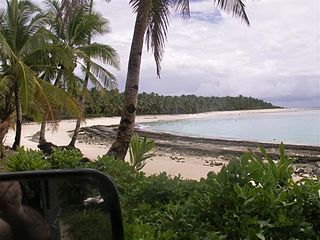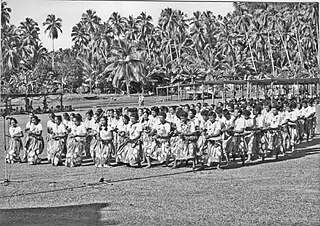
Itu'ti'u is one of the seven districts on the island of Rotuma, a dependency of Fiji. Rotuma's capital, the village of Ahau, is located in this district. It also includes the villages of Savlei, Lau, Feavai, Tuakoi, Motusa, Ropure, Melsa'a, and Losa. [1]

Rotuma is a Fijian dependency, consisting of Rotuma Island and nearby islets. The island group is home to a large and unique indigenous ethnic group which constitutes a recognisable minority within the population of Fiji, known as "Rotumans". Its population at the 2007 census was 2,002, although many more Rotumans live on mainland Fijian islands, totaling 10,000.
A dependent territory, dependent area or dependency is a territory that does not possess full political independence or sovereignty as a sovereign state yet remains politically outside the controlling state's integral area.

Fiji, officially the Republic of Fiji, is an island country in Melanesia, part of Oceania in the South Pacific Ocean about 1,100 nautical miles northeast of New Zealand's North Island. Its closest neighbours are Vanuatu to the west, New Caledonia to the southwest, New Zealand's Kermadec Islands to the southeast, Tonga to the east, the Samoas and France's Wallis and Futuna to the northeast, and Tuvalu to the north. Fiji consists of an archipelago of more than 330 islands—of which 110 are permanently inhabited—and more than 500 islets, amounting to a total land area of about 18,300 square kilometres (7,100 sq mi). The most outlying island is Ono-i-Lau. The two major islands, Viti Levu and Vanua Levu, account for 87% of the total population of 898,760. The capital, Suva, on Viti Levu, serves as the country's principal cruise-ship port. About three-quarters of Fijians live on Viti Levu's coasts, either in Suva or in smaller urban centres such as Nadi—where tourism is the major local industry—or Lautoka, where the sugar-cane industry is paramount. Due to its terrain, the interior of Viti Levu is sparsely inhabited.
Itu'ti'u is the largest district by area and by population. Its name means "Big District" in the Rotuman language, and is traditionally ranked third in terms of chiefly precedence, determined by consumption order in the politically charged kava ceremony. This was determined by its successful allegiance in the Rotuman Religious Wars between the Roman Catholic districts of Juju and Pepjei, (collectively referred to as Faguta), against the predominantly Wesleyan districts alliance, led by the chiefs of Noa'tau, Oinafa, Malha'a, Itu'muta and Itu'tiu.
Rotuman, also referred to as Rotunan, Rutuman or Fäeag Rotuma, is an Austronesian language spoken by the indigenous people of the South Pacific island group of Rotuma, an island with a Polynesian-influenced culture that was incorporated as a dependency into the Colony of Fiji in 1881. Classification of Rotuman is difficult due to the large number of loan words from Samoan and Tongan, as a result of much cultural exchange over the history of the Pacific. Linguist Andrew Pawley groups the language with the West Fijian languages in a West Fijian – Rotuman branch of the Central Pacific sub-group of Oceanic languages.
Kava cultures are the religious and cultural traditions of western Oceania which consume kava. There are similarities in the use of kava between the different cultures, but each one also has its own traditions.

Juju is one of the seven districts on the island of Rotuma, a dependency of Fiji. It includes the villages of Juju, Toai, and Haga.




